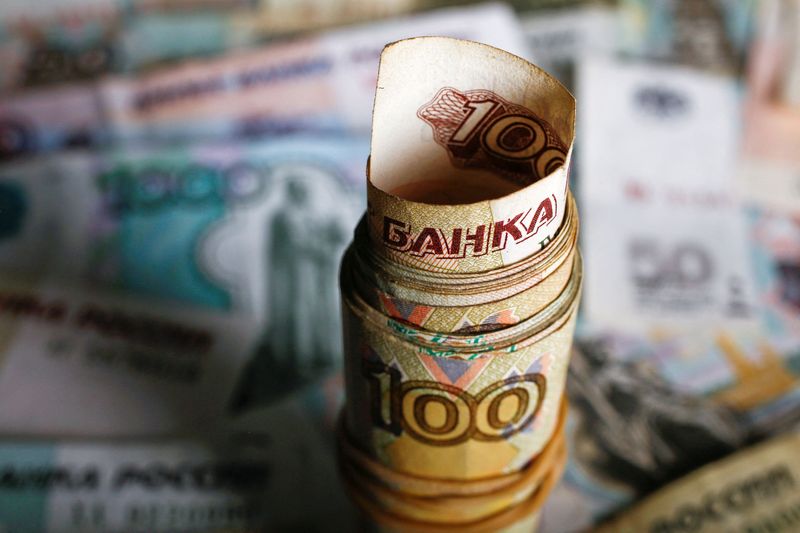By Karin Strohecker and Megan Davies
LONDON/NEW YORK (Reuters) -The U.S. government broadened restrictions on trading of Russian government debt on Tuesday in a bid to punish Moscow for ratcheting up its conflict with Ukraine, a move that analysts said might have a moderate impact near-term but could be a step toward harsher measures.
The U.S. Treasury said it was prohibiting participation in the secondary market for bonds issued after March 1.
The increased restrictions on dealings in Russia's sovereign debt are aimed at "further cutting Russia off from sources of revenue to fund its government or President Putin's priorities, including his further invasion into Ukraine," it said in a statement.
The new restrictions followed Russia ordering troops into separatist regions of eastern Ukraine. Western countries have threatened to go further if Moscow launches an all-out invasion of its neighbor.
"The message from the U.S. is clear, we don't want you to hold Russian assets," said Tim Ash, senior EM sovereign strategist at BlueBay Asset Management. "'Get out now' is the clear-cut message."
U.S. investors have been banned from buying new dollar-denominated Russian debt since 2014, when Russia annexed Crimea. U.S. banks have also been barred from taking part in the primary market for non-rouble sovereign bonds since 2019.
Last year, Biden also barred U.S. financial institutions from taking part in the primary market for rouble-denominated Russian sovereign bonds.
"So we have primary and secondary new issue rouble and dollar debt sanctioned," said Ash. "The next logical step if Russia invades full-scale is sanctioning existing issues secondary."
Biden said that Russia would pay an even steeper price if it continued its aggression.
The latest measures on the rouble debt known by their Russian abbreviation, OFZ, could further stress the bonds. Yields on the 10-year benchmark broke through the 10% watershed last week and are currently at almost 11% - a six year high.
Russian dollar bonds extended their losses a little after the announcement of U.S. sanctions, while the premium demanded by investors to hold Russian debt over safe-haven U.S. Treasuries blew out to 329 basis points, the widest since the COVID market rout in spring 2020.
The impact of curbs on secondary trading has been played down in Moscow. Andrey Kostin, head of state bank VTB, said in November that U.S. sanctions on Russia's secondary OFZ treasury bond market would not be a "serious threat" for the country's financial stability as state banks are much bigger holders of the bonds than U.S. investors.
According to a research note by analysts at VTB on Monday, the foreign share of OFZ holdings was 18%.
Elina Ribakova, deputy chief economist at the Institute of International Finance, said the sanctions on sovereign debt were likely to have a limited economic impact.
"Russia’s fiscal position is in surplus and Russian authorities are overfunding," Ribakova said.
Ribakova said total foreign ownership of Russian debt was about $64 billion, and Russia’s reserves are in excess of $630 billion, while Russian banks have a surplus liquidity of about $11 billion that they could use to buy OFZ as foreign investors exit.
"However, the U.S. administration has clearly signaled further sanctions are possible, and this is only the first tranche of U.S. sanctions in coordination with its partners," Ribakova added.
Ratings agency Fitch said this month that while secondary market sanctions would hamper Russia's fiscal financing flexibility and foreign investment in the country, this would not significantly impact macro stability thanks to ample reserves and buffers.

Still, a ban on secondary trading of new OFZs and new sovereign Eurobonds - especially if extended to non-U.S. people - "could have a material impact on yields," JPMorgan (NYSE:JPM) analyst Jahangir Aziz wrote in a research note ahead of the announcement.
"Although Russia's financing needs are low, at around 1.5% of GDP, this would increase government financing costs and the risk premia for the private sector," he said.